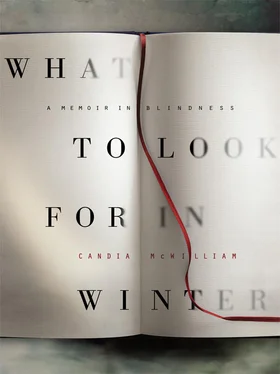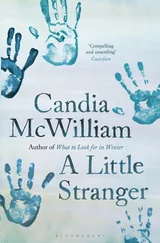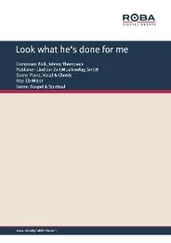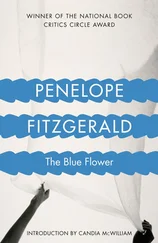Any precise answer rests with that duck mother and her children, so the answer will be, as it is to many things, a dry quack and no more.
We cannot always see the whole picture, after all.
It may be as well to keep a door in the mind open to whatever may alight among the paper and strong drink and forgotten toys.
It is now mid-September. Mr Foss operated on my right leg and both eyes on 30 June. He took out the tendons from behind my knee and sewed them in beneath the skin, stitching up my eyelids to my brows, pegging my brows from stitches above them in the ‘blank’ area of my forehead, so that there is a system of artificial tension that counteracts the blepharospasm’s continual downward force and in so doing offers sight. My forehead hurts. It feels as though it is cork, with drawing pins, six of them, set circumflexwise above each eye. There are six points of pain, connected by unhappy but essential tension.
The effect is at once of wound and freeze, vulnerability and a harder surface than the subtly changing thin-skinned area around a human eye usually offers. My eyes are fat-looking, peering piggily through swollen yet not smooth crevices. They feel bruised and stiff, both the eyes themselves, weirdly, and the lids. But — I can see.
I can see.
I look broken and I look mended. I have a bodged face. I’m not complaining. I’m attempting to define. There is no eyelid and there are no fluttering delicate surfaces for another person to read. I’m unclear as to how my face is legible to anyone who sees it. Most people say reflexively that I look the same. I haven’t asked them, the same as what? There is no need for them to say that; it’s a nervous reaction, like saying one looks well when one has suddenly got fatter. The most sensible description was from a friend who said that I looked as though I’d been stitched up after a fight. Sometimes I feel as though my face has been pegged up like washing, on metal pegs, then hung, heavy, and been frozen like a dishcloth in a cold snap. My soft old face depends loosely from its new circumflexed stitches.
But I can mostly see out from it, out of it, this face on pegs. This return to a world where I can read is an unlooked-for relief, a blessing that I had not imagined would come my way. I had believed that, since blepharospasm rarely goes into remission, I was shut in the dark for good.
Sometimes, if I am tired or frightened, or if the light is bright, I clamp blind again, so I still carry my foldable white stick, though not, of course, on to aeroplanes, since it would make a plausible weapon and is therefore not allowed. I have learned that, as I’m a nervous traveller, I do tend still to go blind at railway stations and airports.
Mr Foss said that my tendons are of notably poor quality and he had to reinforce them with some synthetic strings called something like ‘Plastron’. He says that you can improve the quality of tendons by regular running. He says that running is ‘hell at the time’. It is clear he cannot lie. I still love trying to guess what he will say next.
Mr Foss said that it was ‘a pig of an operation’.
His own sport, I’ve discovered, is high-level competitive fencing.
Mr Foss is slight, and only ever to the point.
Things had got quite bad by the time I went to the hospital for this last operation. Nottingham has several hospitals including the Queen’s Medical Centre, the largest in Europe. I arrived in the morning at the small hospital on the Mansfield Road where Mr Foss had stripped out my eyelid muscles in January, having come down from Colonsay the day before. It was a journey that would not have been responsibly possible on my own, I was so blind by then, yet not an adept, since not a reconciled, nor, thanks to Mr Foss’s operation, a resigned, blind person, and was also still lame from my broken leg. William came with me on the boat to Oban and handed me to his daughter Flora at Glasgow.
She had come up that morning from Euston in order to accompany me to Nottingham. We had a number of train-changes between Glasgow and Nottingham. Flora participated in a Virgin Trains hot-meal survey. Asked to choose between Lancashire Hotpot and Chicken Curry (it was a conspicuously warm day), she asked to try both, otherwise how could it be a survey? She’s skinny and always hungry. She received a thimbleful of hummus and two small red ‘presentation tomatoes’, together with a press release more substantial than the snack itself, about moving forward into a future where the customer came first. You can see why Mediterranean travellers are baffled in Great Britain.
We crossed a lavishly green part of England after the always for me too sudden loss of Scotland.
By the time I was in the hospital, I wanted anaesthesia of thought and condition, and was, I now see, inexcusably unprofessional (is being a patient a profession?) in speaking to both Mr Foss and the anaesthetist the way I did. I asked them if they wouldn’t just let me go to sleep for good.
It was a bad thing to say. I was exhausted by my condition. Nonetheless, it was ugly. When I think of it now, I see — I see! — how things had grown in. Like ingrowing toenails, I had ingrowing eyeballs, or, more precisely, an ingrowing brain. I was doing time with my sadness, it is true, but at least I had the time to do.
Mr Foss, when I asked him, said that our lives are not ours to take, nor are those of others, and that the doors you do not, ever, open are cruelty and madness. He could have said much more.
He did not tell me what follows, but I found out later, and by accident. His great-grandfather Sigismund Stanislaw Voss, a Latvian engineer who spoke six languages, who had converted when he married his Lutheran wife, Wally, had survived the Russians but was lost to the Third Reich, which took him from his post at Massey Engineering in France and to the concentration camp at Drancy. There is no record of his fate.
The anaesthetist, when I asked if he couldn’t just knock me out, said that if anything happened to my life, his wouldn’t be worth living. Later I learned that he had recently had a heart attack and spent many weeks in hospital.
After the operation, he wrote me a detailed thoughtful response to my telling him that I had at some point been ‘aware’ during the operation. This is when the patient can hear what is going on and can think, but is unable to move (or they believe this to be so). As you will imagine, this state has a lot in common with certain nightmares of powerlessness and muffledness, when you know and see but cannot utter no matter how you strive. He questioned me closely, and sent me a number of articles on the subject. His guess was that my odd feeling might relate to my size and to my being an alcoholic. He managed to put both things tactfully. The sort of tact that must have been in demand at the Tudor court.
He said that I must warn any anaesthetist who was about to put me under at any time in the future of this incidence of ‘awareness’ (it’s a medically identified phenomenon), and he or she would increase the dose of one of the drugs involved to make sure that my brain as well as my body slept.
My sons and Fram came up for the night after the operation. I was bandaged and couldn’t see them. I am told that I annoyed them by asking about their journeys. They felt that I should be telling them my news. I didn’t really have any. I hadn’t arrived anywhere yet. I felt a bit useless. Olly had come all the way up just to see some bandaged ghoul on a gantry, probably identifiable as his mother by its bulk. He was having to go to America early the next day.
I am writing this in the beginning of autumn on a balcony beside an Italian lake, like some civilian idea of a real writer. The air is cool. There has been a Shelleyan squall. From where I am writing I can see — already the sentence is too rich in meaning to bear that meaning without my giving it an intrusive interjection for support, like the stitches holding up my stripped eyes — from where I am writing I can see a headland with growing upward out of it one quite small cypress, that seems to be gathering itself slimly for dive or flight. Its poise and pose remind me of a painted diver — the Tufa — on a wall at Paestum, in another part of this country that makes more sense to me than most.
Читать дальше











